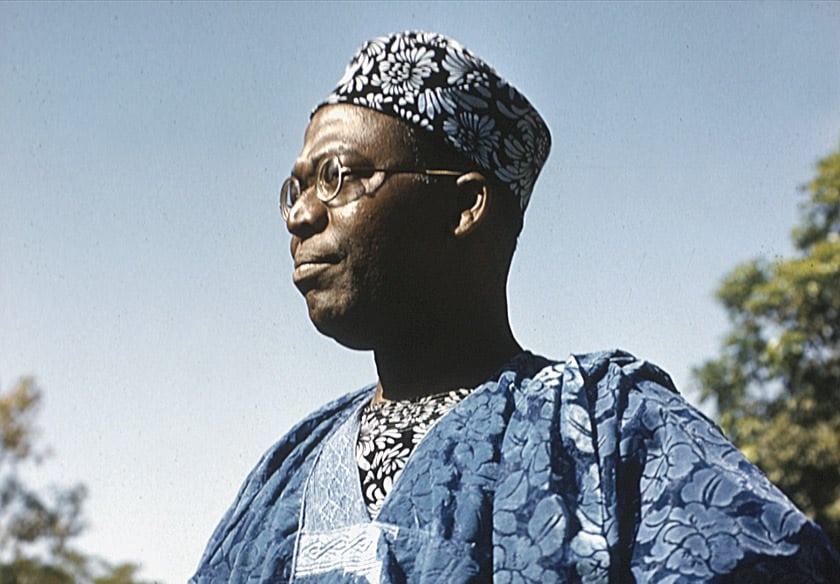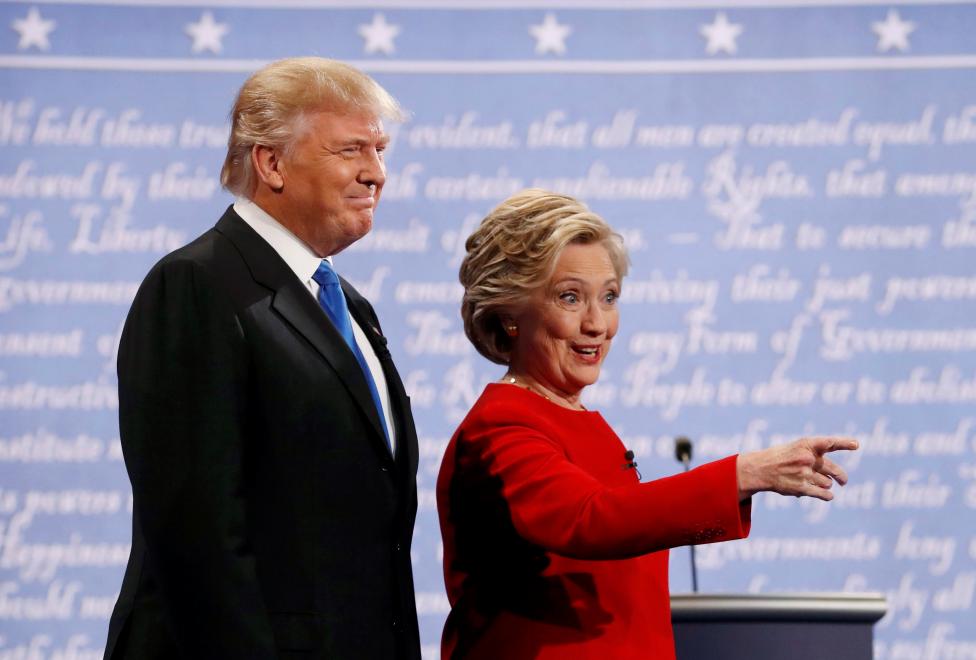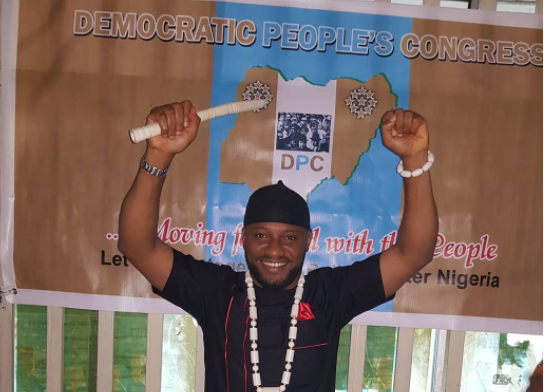BY FEMI KEHINDE
Human characters, develop from childhood, through adolescence and graduates to adulthood. Within these streams of human developmental process, man’s inbuilt and intrinsic qualities begins to unfold.
Harold Wilson, at the age of ten, dreamt of the office of the Prime Minister of Great Britain. At the age of ten, he posed for a photograph with his father at the entrance of No. 10 Downing Street, the Official Residence of the Prime Minister of Great Britain and prophetically, told his father that he would one day, live in the residence as the Prime Minister of Great Britain- that was a mission, a goal and a vision. He prepared for it and accomplished it. He fought the General Election, for the seat of Orminsk; he won and immediately became the Parliamentary Secretary to the Minister of Works at the age of 29. He eventually, became the Prime Minister of Great Britain at the age of 48. Harold Wilson, prepared for this office and ended up, one of the best Prime Ministers of Great Britain.
Obafemi Awolowo, perhaps the best President that Nigeria never had, according to Odumegwu Ojukwu, had from early life, developed traits of tenacity, persistence, deftness and defiance, towards the accomplishment of a set goal.
Awolowo had at the age of 10, defaced the wall of his father- David Sopolu’s house, with words, phrases and sentences that had exhibited his character traits. Perhaps, the most enchanting and enduring one, aside from its pedantic pomposity was “To laugh at infirmity or deformity is enormity;”
That is- it is unwise and sinful to laugh at other people’s misfortune. Around this period, he had also dusted a stronger opponent, at a wrestling duel, upon the sight of his father, from a distance. According to Obafemi “it became imperative that I should stand my ground and I did! I did not see my father again until I got to the house. He was very pleased with my performance and he told me so. As a result of father’s and granny’s encouragement, I became very tough, fearless and defiant as a boy, and acquired an Ikenne-wide reputation, as such, I always stood my ground against anyone even if he was older than I.”
Advertisement
David, impressed by his son- Obafemi’s boldness, fearlessness and defiance, was determined to give Obafemi a good education, after the completion of his elementary school in Ikenne, specifically, a higher college in Lagos, but unfortunately, he died in April, 1920. This sudden twist of fate foreclosed Awolowo’s opportunity of going to Lagos for a higher college.
Life almost came to an abrupt halt, but with candour, grace, resilience and unshaken hope, he weathered the storm of life’s early troubled waters. Within a short span, after elementary education, he became a pupil teacher, stenographer, school clerk, money lender, typist, public letter writer, transporter, etc before he eventually became a lawyer in November, 1946.
Obafemi Awolowo, later Chief, after valiant efforts to make it in life, came to Ibadan in January, 1927 as a student of the Wesley College, Elekuro, Ibadan, which was established in 1905, as a teacher training and pastoral college.
Advertisement
Mr. Obafemi Awolowo, within the one year of his stay in Wesley College Elekuro, Ibadan, did not particularly like the idea of a regimented teacher training course, and the later life of a school teacher. At the end of the session in December 1927, he opted out of the college. He actually deliberately failed the examinations, in an inexcusable manner, in order to ease himself out of the college. The teacher- J.O Ajibade, who marked the script had strong suspicion. According to Obafemi “I failed in such a manner, in order to make my expulsion inevitable ” He however came back to the college again in August 1934, as a college clerk. He had since his life in Wesley College, fancied Ibadan, as a place to live his adult life. In the Wesley College, Obafemi was noted for great acts of insubordination and defiance, to the final year students and as was customary of the school, he was charged before the disciplinary committee of the school.
The particulars of the charge were-
1. That he refused to fag for any of the senior students.
2. That he refused to salute his seniors.
3. That he was sometimes rude in the way he addressed them.
He refused to plead, on the ground that, the judges were among the accusers and he argued that since they were interested in the case, they were bound to be biased against him.
The judges, threatened that they would proceed to trial, but he still refused to plead. Obafemi insisted that he would appeal to the Principal against the judgment, except it was in his favour.
This act of defiance, was greatly applauded by his classmates. The court did not sit after this, throughout the period Obafemi was in Wesley College.
Advertisement
Whilst in Wesley College, it was arranged that the girls at Kudeti Girls School Ibadan, now St. Anne’s school, should pay a social visit to students of the Wesley College on a Saturday afternoon. On the morning of the Saturday in question, each student put finishing touches to their attire, in order to make the best possible impression. Awolowo had worked on his college uniform, to make it impeccable and had even gone out to buy a jar of hair grease, a tin of powder and a pack of handkerchiefs.
A few minutes before the arrival of the girls, the students at Wesley, according to Awolowo, looked “spick and span”. Then as the guests arrived at the gate of the Wesley College compound, the senior prefect called upon the new boys, to lay the table for tea. Obafemi’s reaction was one of “cool and unaffected defiance”. He was determined to meet the female guests on an equal footing. The senior prefect shouted Awolowo’s name, but he gave no heed and he went through the social function, absolutely unperturbed. At the end of the social visit, he was “gated” for several Saturdays and when he left the college in December 1927, he had an outstanding of about ten Saturdays gating to do.
One of his tutors had called Awolowo from a distance, but because the expatriate tutor, anglicized the accent of Awolowo’s name, he refused to respond, despite several calls. The tutor was apparently angry and asked that Obafemi be dragged before him. Obafemi’s defence was that his name was not properly pronounced, and he heard him call him “Awolowo” and that since his name was Awolowo, he could not answer. In despair, anger and exasperation, the tutor ordered him to go and carry twenty four stones and place them in front of his lodging and that this must be done within a short space of time.
Most dutifully, and in utter belligerence and impertinence, he collected twenty four small stones, (pebbles) and arranged them in semi circles, at the entrance of the tutor’s compound.
Advertisement
When the tutor returned and saw this unpardonable affront, he sent for Awolowo and wanted to know why pebbles could pass for big stones. Awolowo’s response was quick and sharp-
“You did not tell me what size and so I used my common sense” The punishment was that he should be “gated” for the rest of the term. Awolowo quickly reminded him that he was already gated, for more than the rest of the term. The bewildered tutor ordered Obafemi out of his presence, instantaneously.
Advertisement
Sir Dr. Kofo Abayomi was president of the Nigerian Youth Movement and also a member of the Nigerian Legislative Council. He resigned his seat in the legislature, to pursue a further study in ophthalmology, in the United Kingdom. There was a need for a bye election. The Nigerian Youth Movement conducted a primary election, between Ernest Ikoli and Samuel Akisanya, and Akisanya won. The leaders of the party however preferred that, Kofo Abayomi’s deputy- Ernest Ikoli, should be fielded for the election, but some members of the Movement, including the young turks like Obafemi Awolowo and Samuel Ladoke Akintola, preferred the choice of Ernest Ikoli, despite his loss. Ernest Ikoli won the election and Akisanya left the NYM and later became the Odemo of Isara. In anger, he referred to SLA and Awolowo as “misguided youths”. In later years, the Odemo of Isara, Oba Akisanya, became Awolowo’s special adviser and confidant as Premier of the Western Region and SLA Akintola, now Premier after Awolowo, reduced Oba Akisanya’s salary to one penny a month, when he crossed to the other side of the divide, during the Western Region crisis.
Alfred Ogbeyiwa, (alias Osibakoro) Rewane, was born as- Ogudegbiyiwa Erewarone, (later abbreviated to “Rewane”) in Warri, Delta state, on the 24th August, 1916. He was the second son of Chief Jemide Rewane. His mother, was the daughter of Chief Mowarin of Agbarho in the present Ugheli North Local Government Area of Delta State. Chief Mowarin was one of the first six warrant chiefs in Urhoboland.
Advertisement
Alfred, popularly referred to as Alfredo, by Awolowo, shared similar character traits, with Chief Obafemi Awolowo, in terms of learning, erudition, ruggedness, defiance, self development, loyalty, commitment to goals and aspirations and above all, a quest for an egalitarian society and a life that is more abundant.
Alfred, was in fact Awolowo’s political secretary, man Friday and a very trusted loyalist. The Itsekiri people and the Delta Province benefitted tremendously from this loyalty and assiduity. Alfred was in Awolowo’s government as chairman of the Western Nigerian Development Corporation (WNDC) and one of the four directors of the NIPC (Nigerian Investment and Promotion Council).
Advertisement
Alfred Rewane started his primary school education, in African School Warri, and proceeded to Government School Warri, where he completed his primary school education. He then gained admission into the famous Dennis memorial grammar school Onitsha, but his father could not afford having two sons in college at the same time. His elder brother, Chief O.N Rewane, the Ologbotsere (traditional Prime Minister) of Warri, was already at Government College, Ibadan.
As a restive youth, he was by sheer providence, spotted by the United African Company, U.A.C, who instantly employed him and took him to their fold for management training in Burutu, to be trained in every aspect of business management and accounting and on completion of this intensive studies, he was posted to Lagos, in a managerial capacity as the Beach master at the Lagos Custom Wharf, where he had so much to do with the control of UAC Labour movement, the UAC being then, the largest employer of labour in Nigeria.
As a restive soul, after serving at several other departments at the UAC head quarters, he voluntarily retired in the early 40s. He found unpleasant, the drudgery, regimented and restricted life of a paid employee.
After his early retirement, mother luck smiled on him, when a European company, with headquarters in the United Kingdom, gave him a contract for the supply of Cow Bones and he later became a major exporter of Bones in Nigeria, a business which had hitherto been unknown in Nigeria, as an export commodity.
With his knowledge in business management, he travelled round the length and breadth of Nigeria for Bones to export. He also added to his export business, the supply of Black Pepper (Igbere), which was a highly priced commodity during the Second World War. This huge success, encouraged him to add timber to his export business.
In 1947, Alfred started a first class night club at Queens Street, Yaba, called the Rex club, which became an attraction for the Nigerian middle and upper class. His night club encouraged indigenous musicians like the late Bobby Benson and his wife, Cassandra. His tax assessment in 1947 was enviably the highest, for any private individual in Nigeria. He was thus, reputed to be one of Nigeria’s wealthiest citizens.
In politics, Alfred began his political career at an impressionable age. His love for the Warri Kingdom and the Itsekiri people encouraged him to go into politics for the economic and political wellbeing of the Itsekiri people. Alfred’s friendship with the late Chief Bode Thomas, brought him to the fore front of the Action Group, of which he became one of its founding members.
This heralded his association with the late Chief Obafemi Awolowo, which later developed into complete and total confidence with each other and perhaps cultic loyalty.
In the educational field in the early 40s, the only government college in the Warri Division, the then Warri College, which provided easy access to education, for the Itsekiri community, was moved to Ughelli in the Urhobo Divison and renamed Government College, Ughelli. In order to fill this educational vacuum, Chief ENA Begho, the late Ologbotsere of Warri, Chief O.N Rewane and Mr. Alfred Rewane founded the Hussey College, Warri on the 3rd of February, 1947. The school was named after a famous colonial educationist and located along the Erejuwa Road in Warri, Delta state. It is one of the oldest and most prestigious colleges in Nigeria. It has produced many eminent and distinguished Nigerians in various spheres of human endeavours. Among its old students, who came from various tribes and backgrounds are- Brigadier Mobolaji Johnson, the former Governor of Lagos State, Brigadier General Bassey Asuquo, Navy Commander Temi Ejoor, Brigadier General Sunday Tuoyo, who were all former military governors Justice Akhigbe, Justice Awala, Chief Emmanuel Ogidi, Dr. Jackson Gaius Obaseki, Chief Ezekiel Olasunmoye Fatoye- a foremost telecommunications expert, prof. Tunde Bajah- a renowned Chemistry teacher, Major Isaac Adaka Boro and distinguished monarchs, like the Owa of Idanre- Oba Fedrick Aroloye and Ogiame Atuwatshe II. Alfred Rewane’s first act of notable defiance and audacity was in the sacking of Bristol Hotel in 1948. Mr. Ivor Cummings- a distinguished African Caribbean national and a top official of the colonial office in London, was scheduled to pay an official visit to Nigeria and naturally, his first port of call was Lagos, then Nigeria’s capital. Accommodation was reserved for him at the Bristol hotel, a foremost hotel, then owned and managed by expatriates.
Apparently, the hotel authority thought that from the sound of his name- Cummings, he was certainly a white Anglo-Saxon, but they were shocked when he presented himself at the reception, that he was black. He was instantly refused a room at the hotel on that ground. A Warri based Sierra-Leonian legal luminary called T.L Williams, witnessed this odious scene. He was helpless and dumb founded. He moved to the nearby Island club, where he met Alfred Rewane and a prominent Lagos lawyer, Oladipupo Odunsin. After relating his story, the famous Lagos lawyer- Odunsin, shouted and exclaimed-
“Our Nigeria of 1948, we cannot have this, let’s go and die!
“But the boisterous Rewane, jumped up and shouted-
“die!? No, let’s go and teach them a harsh lesson”
The atmosphere at the Island club was now charged and under Odunsi and Rewane’s leadership, the Late Milton Macaulay, the Late Prince Adeleke Adedoyin and the late Akiniran Olunloyo, marched through the Onikan stadium, to the Marina, with the support of the elderly members of the island like the late J.K Randle and the late Bolaji Finnih, who had gone to wait for the rampaging youths at the Tinubu police station, in case of arrest by the colonial masters. At the Onikan stadium point, at the Marina, the area boys, known then as Boma boys, armed with sticks and horse whips (koboko), followed the Rewane team, without hesitation, and an assault, was launched on Bistol Hotel. At the end of the rampage, the reception, Bar and restaurant were sacked and the white men in the hotel premises and its vicinity had a sorry and gory tale to tell. The whole hotel was wrecked and left in shambles.
After the rampage, Sir Adeyemo Alakija, then patron of the island club, foreseeing an imminent raid on the island club, took the rampaging youths on a mediatory visit to the Governor General of Nigeria- Sir Arthur Richards, for mediation. Richard deliberately refused to arrest Rewane and his cohorts, because of his belief, that the day of segregation was perhaps gone and he said, “with effect from today, there would be no more European hotel, hospital or club reservation in Nigeria.”
Thus, racial discrimination or apartheid was abolished in Nigeria. The European hospital in Lagos (now military hospital) and European Club at Ikoyi, were renamed Creek Hospital and Ikoyi Club, respectively.
The European hospital at Warri serving the then Central Provinces of Ondo, Benin and Warri, was changed to Maple Annex. The European Hospital at Ibadan was changed to Jericho Nursing Home.
Areas, otherwise known as European Reservation were renamed Government Reserve Area (GRA), and so on, throughout the country and there was general jubilation.
Rewane and Odunsi’s defiance, audacity and insolence, had produced a great result for Nigeria in 1948. This success was greatly applauded at the Island Club with choice wines.
Rewane’s act of defiance was revisited in 1962, at the treasonable Felony trial of Obafemi Awolowo. Rewane was charged with Obafemi Awolowo along with other Action Group colleagues, with the offence of treasonable felony. Alfred was acquitted and discharged after being remanded in prison for four months on the 1st of March, 1963.
Alfred, despite being discharged, remained in the court room, and at the close of the day’s proceedings, went back into the Black Maria which conveyed him back to the prison at Broad Street, where Obafemi Awolowo was also held a prisoner, on the pretext, that he had to collect his personal belongings. At about 8:00pm, he had to be literarily forced out of the prison, leaving behind his leader and other colleagues. To him, his acquittal was meaningless, as long as Awolowo remained in prison custody. A few days later, he savoured the joy of this belligerence and defiance, when he went to Kingsway store at the Marina, to shop for his family. He was deeply moved by the spontaneous acts of solidarity shown to him by the huge crowd, which gathered inside and outside the store. A couple of days later, when Alhaji S.O Gbadamosi and the late S.O Sonibare were arrested on the Federal Government orders, with respect to the loan which the NIPC of which they were directors, took to build Western House on Broad street Lagos, Rewane became more defiant to resist persecution, from the authorities to the very end. In this instance too, they were discharged and acquitted. During Rewane’s trial, the party leader, Obafemi Awolowo, was escorted by armed police men into the court room. According to Rewane- “we all rose to our feet and greeted him loyally, warmly and with deep emotion”
Rewane’s prison custody, with Chief Awolowo in their midst, only transformed the group of the awaiting trials, into a vibrant political club within the prison walls.
When the group of the detainees were dispersed, Rewane was very happy that he was one of the seven detainees, left behind with Chief Awolowo in broad street prison. But despite Rewane’s closeness with Chief Obafemi Awolowo and his cultic loyality that was legendary and notwithstanding the fact that Chief Rewane usually took off his cap to speak with Obafemi Awolowo on the telephone,Obafemi Awolowo would still brook no nonsense or indiscipline from the A.G Chieftains.
Alfred Rewane was a member of the A.G delegation to the 1957 Constitutional Conference in London. At the conference, he became indisposed, he had no choice but to visit a hospital. The Western Region Agent General in London- Chief M.E.R Okorodudu, took Alfred to the Royal free hospital in London, where he was admitted and treated for Festibular Neurosis. The bill was 160 pounds sterling. Chief Okorodudu sent the bill to Chief Awolowo’s hotel, for approval for payment, from the delegations vote, but Chief Awolowo declined to authorize payment. He told Rewane “Alfredo, among all the delegates to this conference, you are the closest to me. Your indisposition is not as a result of your attendance of this conference.”
He added in jest “If I authorize this payment of the bill, it will create a dangerous precedent. How am I sure that some of our colleagues who may be suffering from chronic gonorrhoea would not ask me to approve payment of the bills for their treatment?”
At that point, Chief Awolowo gave Rewane 50 pounds of his own money to pay part of the bill, with further support from Chief S.O Sonibare and Chief Arthur Prest. Alfred made up the money from his personal account and the bill was settled. Those were the days!
Alfred, in 1952, played a pivotal role, in changing the title of the Itsekiri monarch from the Olu of Itsekiri to the Olu of Warri. At the same time, the then Warri Province was changed to the Delta Province, to allay Urhobo fears, thus confining the name Warri to the Administrative Itsekiri Division.
Rewane’s love for the Itsekiri nation was legendary and unfalliable. He had an amazing skill, to place history in its proper perspective. He was a gentleman, a good citizen and a successful businessman. He was a role model in costume and elegance. He was the epitome of wellness and grandeur. He was tall, shimmering, ebony black and stately, that one could easily be hypnotized by his presence. Alfred was unfortunately murdered at his house, No. 100, Oduduwa Cresent, Ikeja Lagos, on the 6th of October, 1995.
May the souls of Obafemi Awolowo and Osibakoro Alfred Rewane continually find peaceful repose with the Lord.
Kehinde, former member of the house of representatives, is a lawyer, author and historian
1 comments







Wait till you meet Falade Emmanuel, you will discover he is another like them. Watchn out for the name, I tell you!